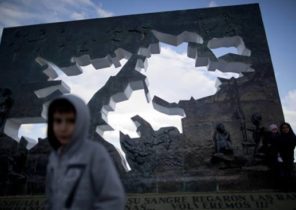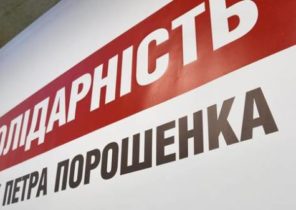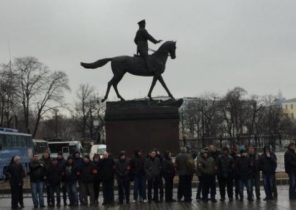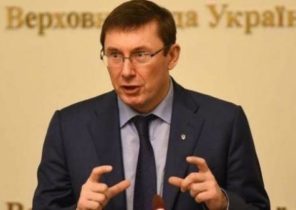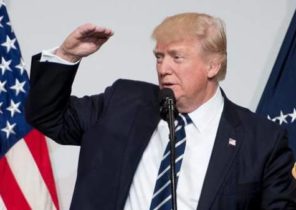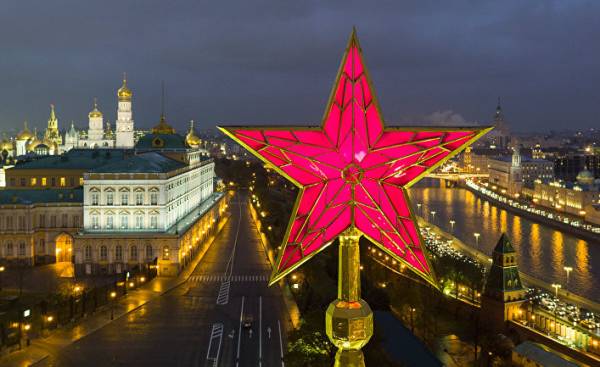
The problem of the West in relations with Russia is the lack of desire to see the reality of the post-Soviet Russian history just because it is easier, says the American journalist David Satter, who recently presented in Vilnius, in his book, “the Less you know — sleep tight.”
According to the American journalist, the overall concept of the West towards Russia is wrong. In his book he examines the apartment bombings in Moscow and Volgodonsk in 1999 and comes to the conclusion that these are Russian special services. In addition, in the book he tries to explain that the era of Boris Yeltsin logically continued with the coming to power of Vladimir Putin, as it adheres to established in the nineties of the last century political strategy.
Sutter worked as a correspondent for the Financial Times in the days of the USSR, and in 2014 he was banned from entry to Russia, as he supposes, in connection with stated in his book information. He argues that the current system in Russia is not viable and the Russians must prepare for change. About his book, view of the situation in Russia, he said in an interview with DELFI.
Delfi: You chose for the title saying “the less you know — sleep tight.” Why?
David Sutter: First of all, because I love Russian Proverbs. But other than that, I think that both in Russia and in the West the problem is that we don’t want to see reality. Just because it’s easier for us, it’s some peace of mind, which we have, should we just close eye on what is happening in Russia. Sometimes you may think that Western people are not insightful, but I think that when they want to be smart, they can do it. In this situation, they just don’t want to see the reality of the post-Soviet Russian history. But still they have to cope with the consequences.
— Following your logic, it turns out that Western countries do not know how to behave in the current situation against Russia led by Vladimir Putin?
— In General terms they know, they saw that this is a country the aggressor and some steps still need to be taken. And they took them. But the General concept still incorrect. It would be better to create a structure of deterrence to such cases as the invasion of the Ukraine, the murder of Boris Nemtsov was not. But after the fact we’re able to understand it.
— In the subtitle you say about the path to terror. What do you mean by terror?
Terror is definitely not mass but selective. But for those who have suffered — that’s no consolation. Still, Anna Politkovskaya, Boris Nemtsov, were the real victims of terror. Even if the terror has not adopted such a scale as in Stalin’s time, when the regime kill his opponents — politicians and journalists, it is terror. And God forbid that the situation has not deteriorated. But I think for those who are attuned to changes in Russia, or exposing some things that the authorities don’t really want to know about them, intimidation and the possibility of reprisals from the regime is the facts of life.
— You worked in Soviet times and was able to work then. Now you have been denied this opportunity. What are the difficulties you experience when working in Russia in the current situation?
— I have to say that in Soviet times was also an attempt to deport me, in 1979. But they made one tactical error. I was an American citizen and worked for the Financial Times — a British newspaper. Now it is not uncommon, but then it was something unusual. And they hoped that nobody would defend. In this they are mistaken, because the Americans threatened to expel the Soviet correspondents, and the British did the same thing. So they did not dare to lose two agents for one correspondent. But I knew that the second time it will not happen again, quietly collecting material for his books over the next years.
The time of Yeltsin is often remembered as a time of democratic development of Russia. You have the book, the current situation is a continuation of the time…
— Yes, it’s a logical extension, because only the KGB could (or now FSB) could provide obtaining the loot. Still, some formal democratic institutions existed and they were sufficient to without provocation to deal with Yeltsin and his entourage, to do some adjustment of mass theft in the country in the nineties. But when you are on your side, the KGB, the current FSB, you can change the situation through provocations. But for that you will pay a fairly high price because the security services will not just serve you, they in the end will you lead. The ancient Greeks realized that defective democracy leads to oligarchy, oligarchy to tyranny. And we saw it in Russia.
— In one interview you said that in Russia after the collapse of the Soviet Union was the lack of moral principles. So?
— You are absolutely right. They believed that the market would fix it, but these ideas occur in societies where there is or was some kind of moral or ethical principles. And there already existed a rule of law. But in Russia as a result of the Soviet experience, it was not. Therefore, the first need was the creation of this, but they believed that in the first place, the necessary transformation of economic structures. And the result was such that the economy has certainly been transformed, but she was a bandit.
Apparently, the lack of a common value base and was the reason that Russia and the West do not always understand each other?
Yes, that’s right. And where the West is wrong all the time, is that we assume that Russia shares our ethos. And Russia is making a lot of effort to convince us that, for example, a fictitious Duma, which is not similar to a real Parliament, under the control of the courts, the media.
In the West there is a cliché — Russia, KGB, intelligence agencies, criminals. Or today’s Russia still is there another way?
— I think the image of Russia is still difficult. Many Americans have positive contacts with the Russians. Many Russians are working in universities, there are many political exiles, and Russian culture attractive. So, to say that it is complete darkness in the eyes of Americans, I would not. People are sensible enough to understand that there is a political system, a society, human contacts, culture. And the great Russian culture loves and appreciates the entire world. So I would not say that about Russia perfectly black impression. The reputation of post-Soviet Russia has suffered a lot especially because of Putin, because in the Yeltsin era, despite the criminalization of society, people saw the process of liberation from Communist control and habits. And while Russia did not create problems for US foreign policy and the West.
— What materials, sources you used when writing the book?
— Much of what is in the book, I wrote in different articles. I was expelled from Russia, was in London, because they could not immediately return to the US, and decided it was time to summarize my experience of post-Soviet Russia and to explain it. In addition, I know that even the Russians don’t quite understand what happened.
— Following the logic of the title of your book, in your opinion, are they sleeping?
They don’t want to know. Much has been published in Russian Newspapers, but no one there tries to communicate and explain. Logically and consistently. For example, what happened in 1993, when Yeltsin dissolved the Parliament. The material shows that he used the provocation to have an excuse to attack the White house. It’s all in Russian Newspapers, not to mention the bombings of 1999. There is a lot of material. But this is all forgotten and nobody wants to analyze it and make the necessary conclusions about those events. I think now there are no books that try to explain it all. And most importantly — to highlight the role of terror and provocations in the creation of today’s Russian system. It is not materialized in a vacuum, it was the result of specific actions.
From your book it is clear that Russia is now an authoritarian state. What future do you see in this situation?
— I believe that the current system in Russia is unsustainable in the future. And the population of Russia, by the way, despite the mass emigration becomes more Mature. People are all the same, despite massive propaganda, have the opportunity to travel, see the world. They can not deny the reality of corruption and lawlessness in Russia. Of course, there is hysteria of Patriotic and chauvinistic euphoria, which distracted the attention, but it’s not going to work forever. So I think that will change, we just have to hope that they will be peaceful, with no casualties. And I think the time has come when people should be psychologically, morally and intellectually to prepare for the change. And the first necessity is to understand what happened. If Russia will again operate a lie, nothing good will come of it. Nothing reflects this better than the 1999 bombings. Historically characteristic of Russia, the concept that the individual man is worth nothing that only the great political objectives are important, harmful.
In other words, when your book will be available in Russia, probably, it will mean some changes?
— I think the ability to buy the book after all is because we are trying to spread in Russia. In the Baltic States, too, because the Russian-speaking population in these countries also needs this, as they watch Russian television.
— And last question. Yet Putin and trump can negotiate?
— I think can and will. On issues where you can and should negotiate, they will negotiate, but on matters of principle, no trump, no other American President would not do. Putin is looking for the weakening of NATO on this one will not go. He is looking for the consent with the annexation of Crimea — that also would be unacceptable to Americans. He wants sanctions lifted without end Russian aggression. I think it’s too unrealistic. So on matters of principle, consent is unlikely to be. But on other issues, even to avoid clashes in Syria, some agreement is possible.

